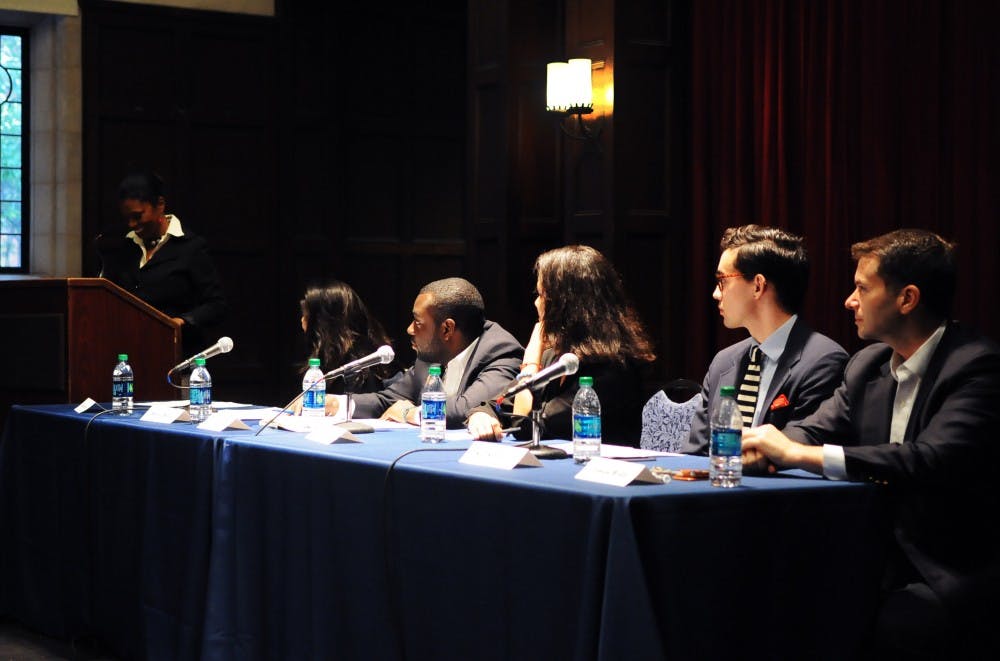
Benefactors of affirmative action spoke on Wednesday night about their experiences and complicated relationship with the topic at an event entitled, “Affirmative (Re)Action.”
The panel, moderated by UA President Joyce Kim, was attended by approximately 100 undergraduate and law students at Houston Hall . Two law professors and three students each made 10-minute cases in favor of racial affirmative action. Penn’s Office of Affirmative Action and Equal Opportunity Programs website states that ”Penn’s robust commitment to diversity” is “grounded in equal opportunity, nondiscrimination, and affirmative action.”
The event was the result of a year’s planning between Kim and the Vice Provost’s Office. More than a dozen student groups sponsored the event.
Professor of Law and Vice Provost for Faculty Anita Allen opened the discussion by giving a historical run-through of affirmative action from the 1935 Wagner Act to President Kennedy’s Executive Order 10925, before talking about her feelings on being a self-identified recipient of this policy.
Allen remembered a time as a graduate student at the University of Michigan in the 1970s when a junior faculty member told her, “I don’t think you’re cut out for this work ... You got in by affirmative action.”
Other panelists also shared stories of having their aptitude questioned in the context of affirmative action.
College senior and UMOJA Co-Chair Denzel Cummings described how his self-doubt began to emerge as he received comments similar to those Allen received about his acceptance to Penn being tempered by this policy.
College senior Katherine Mateo then asked how student interaction and intellectual collaboration is affected if the community carry these notions of affirmative action.
Penn Law professor Tobias Wolff asserted that these experiences were not about affirmative action.
“Instead, they’re ways of people telling you ‘I don’t think you belong here,’” he said. Wolff, who advised the Obama campaign on LGBT issues for the 2008 presidential election, believes that a more diverse student body through affirmative action helps society by fostering interactions between different demographics, reducing underlying racial biases.
In addition to breaking down traditional prejudices, affirmative action can also expand opportunities to otherwise underserved minorities. College junior and President of Sigma Alpha Epsilon Ken Schindler shared how his acceptance to Penn enabled him help recruit more Native Americans like himself on behalf of Native Americans at Penn.
Some of these Native Americans had never left their land reservations before, and many would not have even thought of applying to college, Schindler said. “If it weren’t for Penn, I would have joined the military [in pursuit of] higher education,” he added.
In the following Q&A session, the audience joined the panelists in sharing their own experiences with affirmative action and being an underrepresented minority at Penn.
Allen reassured, “Everyone who is admitted deserves to be here.”
Correction: In a previous version of this article Katherine Mateo was misquoted. It stated: These comments begged a question raised by College senior Katherine Mateo " How does it feel to be on a campus where half the campus feels like you didn’t deserve to be accepted?'"she asked."
It has been updated to say: College senior Katherine Mateo then asked how student interaction and intellectual collaboration is affected if the community carry these notions of affirmative action. The DP regrets the error.
The Daily Pennsylvanian is an independent, student-run newspaper. Please consider making a donation to support the coverage that shapes the University. Your generosity ensures a future of strong journalism at Penn.
DonatePlease note All comments are eligible for publication in The Daily Pennsylvanian.







